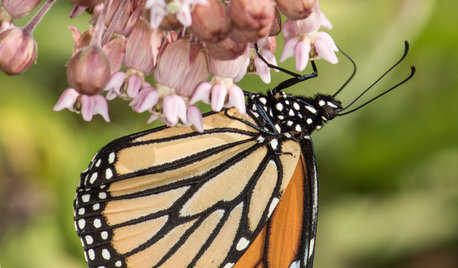Please help me decide whether or not to spray for beetles
mehearty
15 years ago
Related Stories

MOST POPULARHow to Create an Inventory, Whether You're Naturally Organized or Not
Documenting your home items is essential, even if disaster seems unimaginable. And it may be easier than you think
Full Story
LIFEHow to Decide on a New Town
These considerations will help you evaluate a region and a neighborhood, so you can make the right move
Full Story
HOME OFFICESQuiet, Please! How to Cut Noise Pollution at Home
Leaf blowers, trucks or noisy neighbors driving you berserk? These sound-reduction strategies can help you hush things up
Full Story
MATERIALSInsulation Basics: What to Know About Spray Foam
Learn what exactly spray foam is, the pros and cons of using it and why you shouldn’t mess around with installation
Full Story
FLOWERS AND PLANTSHelp Monarchs and Other Butterflies by Planting Common Milkweed
Summer-blooming Asclepias syriaca is an important larval host plant for the monarch butterfly and attracts a number of pollinating insects
Full Story
SUMMER GARDENINGHouzz Call: Please Show Us Your Summer Garden!
Share pictures of your home and yard this summer — we’d love to feature them in an upcoming story
Full Story
DECORATING GUIDESHouzz Call: What Home Collections Help You Feel Like a Kid Again?
Whether candy dispensers bring back sweet memories or toys take you back to childhood, we'd like to see your youthful collections
Full Story
ORGANIZINGDo It for the Kids! A Few Routines Help a Home Run More Smoothly
Not a Naturally Organized person? These tips can help you tackle the onslaught of papers, meals, laundry — and even help you find your keys
Full Story
ORGANIZING4 Questions to Help You Organize Your Favorite Photos
Organize your keeper photos with a system that's just right for you, whether it's in the cloud or you can hold it in your hand
Full Story
DECORATING GUIDESThe Most Helpful Furniture Piece You May Ever Own
Use it as a table, a seat, a display space, a footrest ... and indoors or out. Meet the ever-versatile Chinese garden stool
Full StorySponsored
Your Industry Leading Flooring Refinishers & Installers in Columbus
More Discussions









dancingnancy55
meheartyOriginal Author
Related Professionals
Tempe Landscape Architects & Landscape Designers · River Forest Landscape Architects & Landscape Designers · East Patchogue Landscape Architects & Landscape Designers · Buford Landscape Contractors · Hartford Landscape Contractors · Norwood Landscape Contractors · Salem Landscape Contractors · Concord Landscape Contractors · Goodlettsville Landscape Contractors · Mastic Beach Landscape Contractors · North Plainfield Landscape Contractors · Saint Paul Landscape Contractors · Salmon Creek Landscape Contractors · West Covina Landscape Contractors · Shenandoah Landscape Contractorsbuford
mike_rivers
jlalfred
alisande
buford
aliska12000
barbarag_happy
sergeantcuff
aliska12000
anntn6b
mike_rivers
meheartyOriginal Author
maggie_berry
greenhaven
Krista_5NY
mike_rivers
athenainwi
aliska12000
veilchen
harryshoe zone6 eastern Pennsylvania
jerseywendy
anntn6b
greenhaven
aliska12000
anntn6b
oldroser
aliska12000
maggie_berry
organic_kitten
greenhaven
dlcooper52
veilchen
olga_6b
catsrose
paparoseman
daisy735
dlcooper52
aliska12000
dlcooper52
aliska12000
dan_keil_cr Keil
Terry Crawford
aliska12000
ponce418